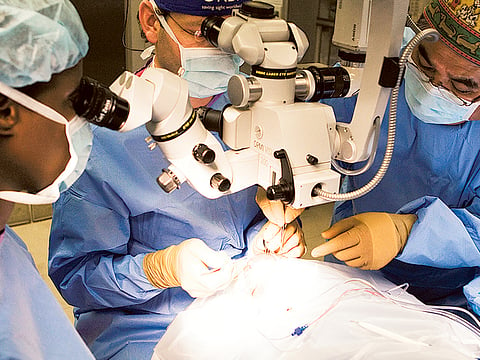Partial cornea transplant now available in Dubai
Dubai Hospital is the only facility in UAE to offer this kind of 20-minute eye procedure

Dubai: Dubai Hospital has conducted a landmark surgery that can restore a patient’s eyesight with transplant of a partial cornea with a 20-minute procedure, a senior doctor has said.
While this procedure is available in the world’s leading hospitals, this is the first time a UAE hospital is offering this surgery.
“The surgery called ‘keratoplasty’ involves the partial or lamellar corneal transplant, namely, the deep anterior lamellar keratoplasty (DALK) and the Descemt’s stripping automated endothelial keratoplasty (DSAEK),” Dr Hani Sakla, consultant ophthalmologist and head of the cataract and cornea team at the Dubai Health Authority (DHA), told Gulf News.
This is an advanced surgery as it maintains the patient’s cornea by only replacing the affected area and layers.
This surgery is very effective in cases of keratoconus (KC) disease which is quite common in the UAE. The disease is a degenerative disorder of the eye in which structural changes within the cornea cause it to thin and change to a more conical shape than the more normal gradual curve. It affects patients between adolescence and the early forties and can eventually result in total loss of vision.
Dr Sakla explained: “The rate of KC worldwide is 1:2000, but it is much higher in the Middle East and the Gulf region because of hereditary and environmental reasons and sometimes due to complications of LASIK surgery.”
“This surgery transplants the affected front area of the cornea with a healthy layer imported from an eye bank in the United States.”
The DALK, which is an outpatient procedure, has proved very effective for these end-stage patients resulting in complete recovery of vision.
He explained that 90 per cent of hospitals worldwide usually remove the entire cornea and transplant another one taken from a cadaver and brought from an eye bank.
“Among the flaws of total corneal transplant is the 15 per cent risk that the body will reject the transplanted cornea, which means that the patient may need to go for another corneal transplant any time during the course of his life.
“However, the partial corneal transplant only replaces the diseased part of the cornea while maintaining the healthy parts. This speeds up the healing process of the patients, reduces the chances of the body rejecting the transplant and restores their eyesight much faster.”
Dr Sakla said that in many cases Dubai Hospital had succeeded in transplanting an inner layer of the cornea in some of the patients that suffer from bullous keratopathy, which is a disease that occurs because of complications during the cataract surgery, or patients with hereditary eye diseases affecting the inner layer of the cornea, which is responsible for the corneal transparency.
“For these kinds of diseases, replacing the entire cornea is very hard for the patients as it requires one year for them to recover their vision and the chances of rejection are high. However, with the DSAEK surgery only the diseased inner most layer — which is 90 micron thick — is replaced in a procedure that takes only 20 minutes and the patient recovers his vision in a few days,” he explained.
This procedure is carried out under local anaesthesia lasting for 20 minutes that entails closing the eye and making a single incision that heals within a week, he added.
So far Dr Sakla has conducted 100 keratoplasties, following up with patient’s treatment for over three years in some cases. “The rate of success is more than 97 per cent in this surgery. Patients are under regular follow-up and, even after full recovery, are instructed to visit the hospital should they notice any symptoms,” he added.
The surgery is done free of cost for UAE nationals and is also covered under most health insurances.


